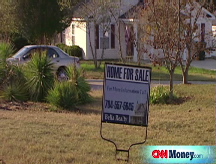Bush signs housing rescue law
President enacts controversial measure that aims to help borrowers, bolster the housing market and provide a fail-safe for Fannie and Freddie.
NEW YORK (CNNMoney.com) -- President Bush on Wednesday signed into law a sweeping housing bill that aims to boost the struggling housing market and bolster mortgage finance giants Fannie Mae and Freddie Mac.
The Senate voted 72-13 in favor of the bill on Saturday, after the House passed it three days earlier.
"We look forward to put in place new authorities to improve confidence and stability in markets, and to provide better oversight for Fannie Mae and Freddie Mac," said White House spokesman Tony Fratto. "The Federal Housing Administration will begin to implement new policies intended to keep more deserving American families in their homes."
The new law, one of the most far-reaching on housing in decades, marks the centerpiece of Washington's efforts to address the nation's housing meltdown.
The legislation has two principal objectives: to offer affordable government-backed mortgages to homeowners at risk of foreclosure, and to bolster Fannie and Freddie with a temporary rescue plan and a new, more stringent regulator.
The White House last week reversed its long-standing threat to veto the bill. In fact, the administration still objects to parts of the legislation, including aid to states to buy foreclosed properties.
But the president decided to sign it since "oversight of the housing government sponsored enterprises (GSEs) and the new temporary authorities requested by [Treasury] Secretary [Henry] Paulson are urgently needed now, and they'll contribute to confidence and stability in housing and financial markets," Fratto said last week.
Provisions that will most directly affect consumers and communities include:
A larger role for the Federal Housing Administration. The FHA will be allowed to insure up to $300 billion in new 30-year fixed-rate mortgages for at-risk borrowers in owner-occupied homes if their lenders agree to write down loan balances to 90% of the homes' current appraised value.
The cost of the new FHA program - which would begin on Oct. 1 and be in place for just a few years - will be funded by fees from Fannie and Freddie, along with fees paid by both lenders and borrowers.
While the law authorizes the FHA to insure up to $300 billion in loans, the CBO estimates that the agency is only likely to insure up to $68 billion and help keep roughly 325,000 people in their homes. Those estimates were based on the CBO's assessment of who is likely to qualify under the program and accounts for a certain number likely to default anyway.
(Here are more details on this provision.)
A stronger regulator for the GSEs. The new regulator will have a greater say over how well funded the two government sponsored enterprises (GSEs) are - a major concern in the markets that has sent stocks in both companies plunging in the past two months.
A permanent increase in "conforming loan" limits. The law will permanently increase the cap on the size of mortgages guaranteed by Fannie and Freddie to a maximum of $625,500 from $417,000.
The FHA maximum loan limits for high-cost areas would also increase to a maximum of $625,500. Higher loan limits will make it easier for borrowers to get mortgages, because those mortgages are more likely to be traded if they are considered conforming.
A new home-buyer credit. The new law includes a tax refund for first-time home buyers worth up to 10% of a home's purchase price but no more than $7,500.
The refund, however, serves more as an interest-free loan, since it would have to be paid back over 15 years in equal installments.
A ban on down-payment assistance from sellers. The new law eliminates a program that has allowed sellers to provide down payment assistance for FHA loans.
The law would also increase to 3.5% from 3% the down payment requirement for borrowers getting FHA loans.
A new affordable housing trust fund. The law establishes a permanent fund to promote affordable housing. The fund will be paid for by fees from Fannie and Freddie.
Grants to states to buy foreclosed properties. The law grants $4 billion to states to buy up and rehabilitate foreclosed properties. The White House has opposed such funding, contending that it will benefit lenders and not homeowners.
A late and controversial addition to the new housing law provides temporary authority for the Treasury to lend a financial hand to Fannie Mae and Freddie Mac if the Treasury deems it necessary to help stabilize markets.
Concerns over whether Fannie Mae (FNM, Fortune 500) and Freddie Mac (FRE, Fortune 500) will have enough money to weather future losses in the housing market has sent shares plummeting in recent weeks. Since the beginning of June, Fannie's stock price has dropped 55% and Freddie's plummeted 64%. For the past year, they're both down over 80%.
Fannie and Freddie guarantee the purchase and trade of mortgages and own or back $5.2 trillion in mortgages.
The law includes provisions that let Treasury offer Fannie and Freddie an unlimited line of credit and buy stock in the companies. The provisions expire in 18 months.
Both critics and supporters of the Paulson plan have expressed concern that loaning or investing money in the companies could leave taxpayers with a fat bill to pay.
Treasury Secretary Paulson has said that merely having the powers in place may boost confidence in the two companies enough to preclude the need for Treasury to step in.
The Congressional Budget Office last week estimated the potential cost of a rescue could be $25 billion. CBO said there is probably a better than 50% chance that Treasury would not need to step in. It also said there is a 5% chance that Freddie's and Fannie's losses could cost the government $100 billion. ![]()




